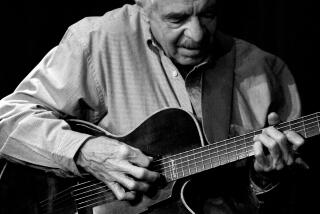Guitarist Cooks Up Eclectic, Electric Brew : Music: Bill Frisell is being hailed as a guitar hero for the 1990s. His wide-ranging repertoire blends the influences of many musicians.
- Share via
SAN DIEGO — The sound of his electric guitar probes through space like some futuristic laser weapon.
At 39, Bill Frisell, who plays Elario’s tonight at 8 and 10, has merged influences from Wes Montgomery, Jim Hall, Jimi Hendrix, country-Western and be-bop into a fresh, eclectic brew that has critics hailing the emergence of a guitar hero for the 1990s.
Frisell is revered among music reviewers. Nearly every project he touches rates five stars, whether it’s jazz with drummer Paul Motian, whacked out make overs of movie music with saxophonist John Zorn’s band, Naked City, or five albums of his own.
His newest recording, “Is That You,” includes only drummer Joey Baron from Frisell’s regular band. The music consists of nine originals plus warped versions of the Aretha Franklin hit “Chain of Fools” and Henry Mancini’s movie theme, “The Days of Wine and Roses.”
Frisell’s last album with his band was the 1989 “Before We Were Born.” Like Frisell’s playing, the instrumentation presents a new twist. Baron and Kermit Driscoll hold down traditional drums and bass positions, but cellist Hank Roberts adds unusual new colors.
“He can cover such a wide range of functions,” Frisell explained. “He can play bass (parts). Or play in the melody range where I am, or in the middle. So his function can be almost anything. That’s actually true of everyone in the band. Kermit can play melodies, and Joey even plays some melodies on drums.
“But more than the instrumentation, it’s the person that I choose. Musically we relate on a high level, but we’re also close friends. That’s true with everyone in the band. I’ve been playing with Hank and Kermit since 1975. The band didn’t really start until five years ago, but I played a lot with them over the years, so we already had a pretty strong connection.”
Always in search of freshness and spontaneity, Frisell includes little of his past material in his live shows with the group. Instead, he is using this tour, which opened Oct. 3 in Oakland, to develop music for an album he plans to record later this month.
“We’re trying to play something new just about every day,” Frisell said. “We’re recording in the middle of this tour, and I want to do it very quickly and have it represent what the band is like live.”
Besides averaging an album a year of his own, Frisell keeps busy playing a variety of other sessions. In the past, these have included albums with Living Colour guitarist Vernon Reid, Power Tools (including drummer Ronald Shannon Jackson), saxophonist Jan Garbarek, bassist Eberhard Weber and drummer Billy Hart.
Later this year, Frisell will work with Motian on an album of music by the late pianist Bill Evans. And a new album with Zorn is due early next year.
Also planned is a session pairing the risk-taking Frisell and such longtime associates as bassist Charlie Haden with saxophonist David Sanborn, whose music has generally had a broader, more commercial appeal than Frisell’s. The meeting could bring new listeners to Frisell while expanding Sanborn’s musical horizons.
Yet another album will feature Frisell with clarinetist Don Byron.
In fact, Frisell originally set out to be a clarinetist himself. He played the horn seriously through high school in Denver, and only goofed around on guitar as a hobby.
In the late sixties, he heard Montgomery for the first time and began thinking more seriously about the guitar. He played clarinet through two years of studying music at the University of Northern Colorado, then hooked up with guitar instructor Dale Bruning, who exposed him to the jazz of Charlie Parker, Monk and Hall, all important influences.
Frisell saw Hendrix in concert twice during the late ‘60s, but wasn’t hit with the full impact of the music until years later: the inventive uses of echo and feedback, the slithering jazz-based runs, the slurred, plaintive blues cries.
“I was more impressed with the fact that he was destroying his equipment,” Frisell said. “The whole sound was so radical, it’s taken a long time for people to figure out what he was doing. I wasn’t that far along in my playing at the time.”
Some young guitarists start out playing rock and gravitate later toward jazz, but Frisell took a different path. From 1969 to 1974, he was dedicated to jazz, even though a part of him wanted to follow in Hendrix’ tracks. That part came out of the closet for good in 1975, when Frisell heard fellow guitarist Mark Miller playing loud and aggressively in a small club, crossing freely between jazz, rock and other forms.
“The most important thing that happened to me is I became open to any kind of music,” Frisell said. “I always feel uncomfortable with labels and categories. I don’t think they’re very healthy. A few years ago, I figured out it was all potentially good. Rather than saying I’m rock or jazz, I don’t know what to call it anymore.”
Frisell completed a program in music at the Berklee School of Music in Boston during the mid-1970s, then lived in Belgium for a year, recording his first album with German bassist Weber.
To date, Frisell has played on nearly 50 albums. Yet, because his music is so unconventional, he gets virtually no exposure on commercial radio and remains relatively unknown to a large number of music fans.
On this tour, he is playing many cities across the country for the first time, including San Diego. While he might spy some curious expressions on the faces of people hearing his music for the first time, he doesn’t pay much attention.
“I’m more focused on the playing, the guys in the band. I definitely feel the energy the audience is putting out. I guess I get it more from what people tell me later. Someone will come up to me and say that when we started out, they didn’t know what was going on, but then they got into it. If people give the music enough time, keep an open mind and listen to it a whole night, they usually end up liking it.”
More to Read
The biggest entertainment stories
Get our big stories about Hollywood, film, television, music, arts, culture and more right in your inbox as soon as they publish.
You may occasionally receive promotional content from the Los Angeles Times.










